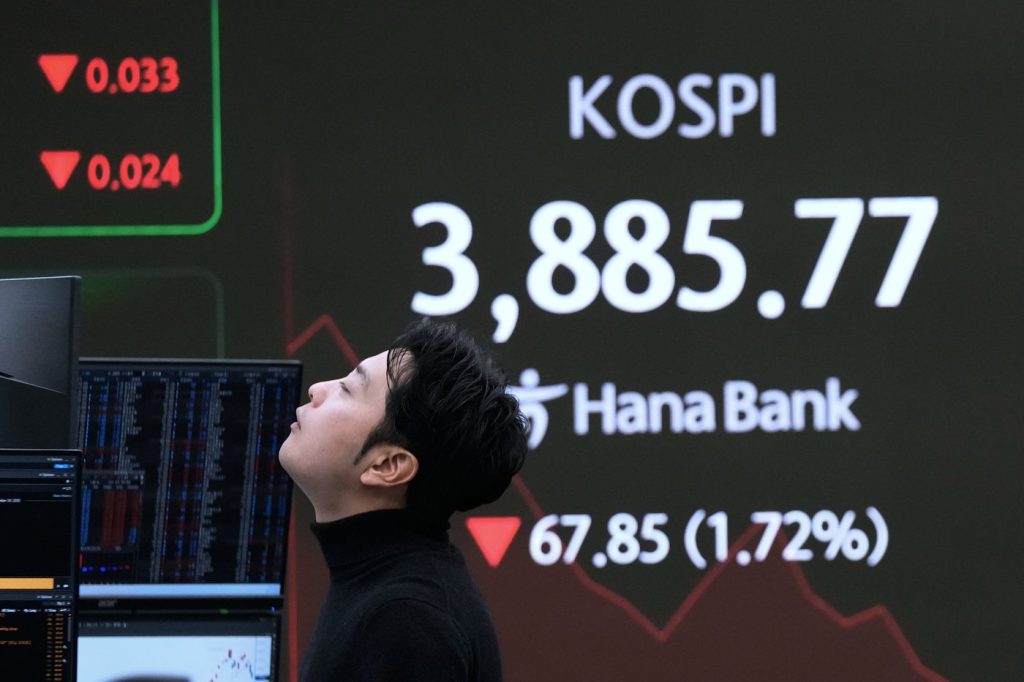TOKYO (AP) — Asian shares experienced a retreat in cautious trading on Wednesday as investors awaited an earnings report from Nvidia, which is anticipated to serve as a bellwether for the burgeoning interest in artificial intelligence (AI) technology. Japan's benchmark Nikkei 225 index remained nearly unchanged at 48,724.17.
In the Hong Kong market, the Hang Seng index fell by 0.5% to 25,812.54, while the Shanghai Composite dipped just over 1 point, closing at 3,939.29. Australia’s S&P/ASX 200 experienced a minor loss of 0.1%, ending at 8,458.40. South Korea’s Kospi index similarly shed 0.5% to reach 3,934.58.
Nvidia's earnings report for the last quarter is scheduled for release later in the day, which could have significant implications for market sentiment. Additionally, a U.S. jobs report, set to be published on Thursday after a break in updates due to the U.S. government shutdown, is another element contributing to the cautious trading atmosphere.
Share prices across global markets fell on Tuesday, with Nvidia leading Wall Street lower by dropping 2.8%. This decline contributed to Nvidia's loss of more than 10% for the month, a significant fall that qualifies as a correction. In the U.S., the S&P 500 index declined by 0.8% to 6,617.32, moving further away from its all-time high reached late last month. The Dow Jones Industrial Average decreased by 1.1% to 46,091.74, and the Nasdaq composite dropped 1.2% to 22,432.85.
Nvidia’s performance is particularly crucial for savers' 401(k) accounts due to its substantial market capitalization, making it one of the most influential stocks on Wall Street. It has been known to steer the direction of the S&P 500 significantly on certain days, especially after a surge in demand for its AI chips, which previously helped it reach a total market valuation of over $5 trillion.
The recent difficulties in the U.S. stock market mark a stark contrast to the nearly relentless growth observed since April, when Wall Street last suffered a sell-off following President Donald Trump's unexpected tariffs announcement. Critics suggest that the preceding rally may have driven prices too high too quickly, leaving the market vulnerable to a sharp decline.
Concerns about potential bubbles in the rampant AI market have been highlighted; in a recent Bank of America Global Research survey, 45% of global fund managers identified an AI bubble as the top risk, overshadowing concerns about the bond market, inflation, and trade disputes.
Other sectors, including cryptocurrency, are also facing recent struggles. Bitcoin’s price fluctuated below $90,000 on Tuesday, a drop from nearly $125,000 recorded last month, although it later regained some ground. Early Wednesday, Bitcoin's value was down 1.3% at $91,700.
In foreign exchange markets, the U.S. dollar declined to 155.46 Japanese yen from 155.51 yen, while the euro remained steady at $1.1581. In energy trading, benchmark U.S. crude dropped by 19 cents to $60.48 a barrel, while Brent crude, the international standard, fell by 20 cents to $64.69 a barrel.
AP Business Writer Stan Choe contributed to this report.











